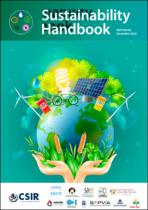JavaScript is disabled for your browser. Some features of this site may not work without it.
- ResearchSpace
- →
- Research Publications/Outputs
- →
- Book Chapters
- →
- View Item
| dc.contributor.author |
De Jager, Peta

|
|
| dc.contributor.editor | De Jager, Peta | |
| dc.date.accessioned | 2023-02-26T08:07:57Z | |
| dc.date.available | 2023-02-26T08:07:57Z | |
| dc.date.issued | 2022-12 | |
| dc.identifier.citation | De Jager, P. 2022. <i>The Sustainability Handbook: Volume 5</i>. s.l.:Alive2Green. http://hdl.handle.net/10204/12611. | en_ZA |
| dc.identifier.uri | http://hdl.handle.net/10204/12611 | |
| dc.description.abstract | The South African Institution of Civil Engineering (SAICE) recently published its latest infrastructure report card. Unsurprisingly, the findings reflected that in many instances our infrastructure assets are in poor and worsening shape. At the launch of the report card, SAICE leadership were at pains to point out that despite this, there are pockets of excellence. We need to identify good examples and the best practices and leadership approaches that ensure success. This edition of the Sustainability Handbook features a number of thought pieces from leaders in various sectors. It also features disruptive and experimental work. No doubt, simply continuing as we do, and expecting a different outcome is flawed. In this edition, Campbell provides thought leadership asking the question: "Should the National Treasury be the custodians of Public Procurement?" Self-proclaimed outlier and disruptor Lipshitz discusses the troubling, but fake, social media claiming that, as Eskom is not buying diesel for its peaking power stations, South Africa will be beset with a nationwide lasting blackout on 9th December 2022. Given South Africa's ongoing experiences with loadshedding, amplified by messages that many parts of the world face energy insecurity, such a message seemed both plausible and alarming. Implications ranging from knock on effects of water, food security and so on are unpacked, reminding us of the fragility and interconnected nature of our systems. | en_US |
| dc.format | Fulltext | en_US |
| dc.language.iso | en | en_US |
| dc.publisher | Alive2Green | en_US |
| dc.relation.uri | https://sustainability-handbook.alive2green.co.za/current-issue/ | en_US |
| dc.subject | South African infrastructure | en_US |
| dc.subject | Loadshedding | en_US |
| dc.subject | Green buildings | en_US |
| dc.subject | Green transport | en_US |
| dc.subject | South African Institution of Civil Engineering | en_US |
| dc.subject | SAICE | en_US |
| dc.title | The Sustainability Handbook: Volume 5 | en_US |
| dc.type | Book | en_US |
| dc.description.edition | 5 | en_US |
| dc.description.pages | 82 | en_US |
| dc.description.placeofpublication | Cape Town | en_US |
| dc.description.cluster | Smart Places | en_US |
| dc.description.impactarea | FBI Management Area | en_US |
| dc.identifier.apacitation | De Jager, P. (2022). <i>The Sustainability Handbook: Volume 5</i>. Alive2Green. http://hdl.handle.net/10204/12611 | en_ZA |
| dc.identifier.chicagocitation | De Jager, Peta. <i>The Sustainability Handbook: Volume 5</i>. n.p.: Alive2Green. 2022. http://hdl.handle.net/10204/12611. | en_ZA |
| dc.identifier.vancouvercitation | De Jager P. The Sustainability Handbook: Volume 5. [place unknown]: Alive2Green; 2022.http://hdl.handle.net/10204/12611 | en_ZA |
| dc.identifier.ris | TY - Book AU - De Jager, Peta AB - The South African Institution of Civil Engineering (SAICE) recently published its latest infrastructure report card. Unsurprisingly, the findings reflected that in many instances our infrastructure assets are in poor and worsening shape. At the launch of the report card, SAICE leadership were at pains to point out that despite this, there are pockets of excellence. We need to identify good examples and the best practices and leadership approaches that ensure success. This edition of the Sustainability Handbook features a number of thought pieces from leaders in various sectors. It also features disruptive and experimental work. No doubt, simply continuing as we do, and expecting a different outcome is flawed. In this edition, Campbell provides thought leadership asking the question: "Should the National Treasury be the custodians of Public Procurement?" Self-proclaimed outlier and disruptor Lipshitz discusses the troubling, but fake, social media claiming that, as Eskom is not buying diesel for its peaking power stations, South Africa will be beset with a nationwide lasting blackout on 9th December 2022. Given South Africa's ongoing experiences with loadshedding, amplified by messages that many parts of the world face energy insecurity, such a message seemed both plausible and alarming. Implications ranging from knock on effects of water, food security and so on are unpacked, reminding us of the fragility and interconnected nature of our systems. DA - 2022-12 DB - ResearchSpace DP - CSIR ED - De Jager, Peta KW - South African infrastructure KW - Loadshedding KW - Green buildings KW - Green transport KW - South African Institution of Civil Engineering KW - SAICE LK - https://researchspace.csir.co.za PY - 2022 T1 - The Sustainability Handbook: Volume 5 TI - The Sustainability Handbook: Volume 5 UR - http://hdl.handle.net/10204/12611 ER - | en_ZA |
| dc.identifier.worklist | 26427 | en_US |






